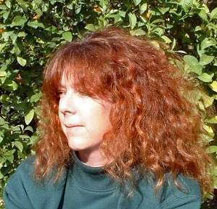|
||||||||||||
|
Skip Navigation | |||||||||||
Meet the New English Chair: Dr. Jackie Stallcup
The incoming chair of English, Dr. Jackie Stallcup, still can’t believe she gets paid to do something she loves as much as teaching at CSUN, though her career trajectory has been anything but direct. Initially accepted to Cal State Los Angeles’s business program out of high school, she notes with a laugh that she didn’t actually know, beyond wearing suits to work, what it meant to be a businessperson. She soon redirected her energy toward a major in animal science at Cal Poly Pomona, but second-guessed that option when she heard that she would have to castrate a pig—perhaps, rumor had it, with her teeth. Remarkably, it wasn’t until Stallcup’s junior year at Pomona that she took freshman composition — a mystery she really can’t explain. There she received positive feedback on her writing and felt that perhaps she had finally found her niche. After changing her major and graduating, she worked in publishing for six years. Eventually turned off by the grind of working at a monthly magazine, she became attracted to the idea of teaching and entered a Ph.D. program in literature at UC Riverside. It was in an 18th-century literature course at UCR that Stallcup wrote a paper on Gulliver’s Travels, responding to the story’s elements as a work of children’s literature. “It was another moment of, Aha! I’ve finally found my place!” she says. In examining the many adaptations that have been made of Jonathan Swift’s satiric work to make it more palatable to children—at least in the minds of the adults doing the adapting — became fascinated with what children’s literature can tell us about popular conceptions of childhood. Still, one last hurdle remained in her career path: her first, observed student teaching session. She recounts, “I hauled myself to the top of the stairs and stood there for a moment. Off to my left was the classroom and straight in front of me was the women’s room. It was a moment of decision. I could go teach my class, or I could go puke.” Happily, she chose the former; she says that her nervousness almost instantly melted away and that she’s loved stepping in front of a class ever since. Upon graduation she practically forced herself on Cal Poly Pomona, convincing their English department against the odds that they needed a children’s lit specialist. “At that time children’s lit was a service course that no one took seriously or wanted to teach,” Dr. Stallcup says. Though scholarship in children’s literature has come a long way over the past two decades, there are still professors who doubt that it bears academic scrutiny, or they simply dismiss the point of analyzing what they refer to as cute kiddie books—in which case Stallcup, to illustrate a point about academia’s often frustratingly hierarchical approach to “true” literature, can sometimes be heard speaking in a sing-song tone about Walt Whitman’s “fuzzy-wuzzy beard.” Then she will implore anyone who will listen to look past the juvenile humor—or, more to the point, poop jokes—in Dav Pilkey’s The Adventures of Captain Underpants to “reconsider some of the [literary] boundaries that have marked our world.” Knowing that students are often dogged by the same level of judgment about their academic and career choices, Dr. Stallcup is enthusiastic about mentorship. She considers it a benefit that she grew up in southeast Los Angeles and attended some of the same community colleges, shares some of the same cultural references, and faced some of the same indecision about college as many of her students. “I have had so many incredibly patient, kind, and encouraging mentors to help me figure out who I am, what I want to do, and how to do the things that I want to do,” she says. “Connecting with a mentor is one of the most important things that I think anyone can do.” In fact, as pleased as she is to have been elected as English chair, she’s not sure how she’s going to get through the next several years without teaching, perhaps in part because she feels she learns as much from her students as they learn from her. Dr. Stallcup, who has taught at CSUN since 1999, lives in Ontario, Calif., with her husband, Wade, who is an artist, as well as a menagerie of pets including five cats, one dog, and two horses. She says that caring for the horses is a soothing exercise for her. As for another therapeutic activity you may often see her engaged in: “I knit in meetings because, believe it or not, it really helps me to focus,” she says. “So if I’m in a meeting with you and I’m knitting away at a hat or a pair of baby booties, you know that I’m really listening and absorbing with all my might.” That said, please don’t take it personally if she doesn’t knit when she’s meeting with you. — Submitted by Teresa K. Morrison |
|
|||||||||||
|
||||||||||||
